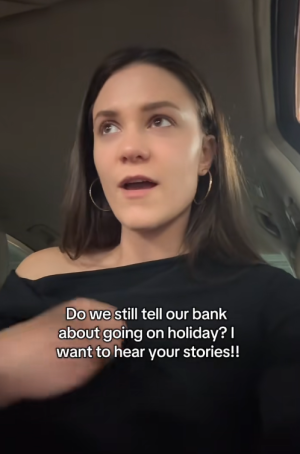Are you making this travel mistake that could freeze your overseas bank account?
By
Gian T
- Replies 0
Dreaming of escaping the Aussie winter for a sun-soaked European adventure or a tropical getaway?
Before you start packing your bags and dusting off your passport, there’s one crucial step you might be forgetting.
One that could leave you stranded overseas with a frozen bank account and no access to your hard-earned cash!
It’s a simple mistake, but it’s catching out thousands of Australians every year: not letting your bank know you’re heading overseas.
While it might seem like a minor detail, failing to notify your bank about your travel plans can trigger their fraud detection systems, leaving you locked out of your own money just when you need it most.
Banks are on high alert for suspicious activity, especially when it comes to transactions in unexpected locations.
If you usually use your card for groceries in Sydney and suddenly there’s a charge from a café in Croatia, your bank’s fraud department might assume your card has been stolen or cloned.
Their response will be to lock the card immediately to protect you from potential scams.
Julia Juhasz, an Aussie traveller, was wise to worry about this before her three-week European holiday.
She reached out to her bank, ANZ, to check what she needed to do. ANZ confirmed that not alerting them to your travel plans can result in your card being blocked if overseas transactions suddenly appear.
Julia’s concerns aren’t just hypothetical. After she posted about her worries on social media, the comments section was flooded with stories from fellow travellers who’d been caught out:
'My card got blocked just before I was leaving because I booked accommodation overseas, they said I should’ve told them,' one person shared.
'We’re with Westpac and they blocked the card on the first transaction. We had to quickly call and let them know,' added another
And it’s not just ANZ or Westpac customers at risk—this can happen with any major Australian bank.
Some readers might be thinking, 'I always tell my bank, but my card still got blocked!' You’re not alone.
Even with the best intentions, the system isn’t foolproof. One traveller shared that their parents had notified their bank before a trip, but their card was still frozen after an overseas transaction.
ANZ explained that while letting your bank know about your travel plans helps reduce the risk of being blocked, their fraud and scam protections are always running in the background.
Sometimes, the system errs on the side of caution to keep your money safe. If you do get blocked, banks say they’ll do their best to get you back up and running as quickly as possible.
It might feel like a hassle, but remember: your bank’s fraud detection systems are there to protect you.
With scams and card fraud on the rise, especially overseas, banks would rather be safe than sorry.
According to the Australian Bureau of Statistics, nearly 1.7 million Aussies travelled overseas in August last year alone—so you’re not alone in facing these challenges.
Credit: TikTok
 Did your bank save the day, or did you have to scramble to get access to your money? Share your tips, tricks, and travel tales in the comments below.
Did your bank save the day, or did you have to scramble to get access to your money? Share your tips, tricks, and travel tales in the comments below.
Read more: Major Aussie bank launches 'kill switch' against scams! Here's how you can benefit from it
Before you start packing your bags and dusting off your passport, there’s one crucial step you might be forgetting.
One that could leave you stranded overseas with a frozen bank account and no access to your hard-earned cash!
It’s a simple mistake, but it’s catching out thousands of Australians every year: not letting your bank know you’re heading overseas.
While it might seem like a minor detail, failing to notify your bank about your travel plans can trigger their fraud detection systems, leaving you locked out of your own money just when you need it most.
Banks are on high alert for suspicious activity, especially when it comes to transactions in unexpected locations.
If you usually use your card for groceries in Sydney and suddenly there’s a charge from a café in Croatia, your bank’s fraud department might assume your card has been stolen or cloned.
Their response will be to lock the card immediately to protect you from potential scams.
Julia Juhasz, an Aussie traveller, was wise to worry about this before her three-week European holiday.
She reached out to her bank, ANZ, to check what she needed to do. ANZ confirmed that not alerting them to your travel plans can result in your card being blocked if overseas transactions suddenly appear.
Julia’s concerns aren’t just hypothetical. After she posted about her worries on social media, the comments section was flooded with stories from fellow travellers who’d been caught out:
'My card got blocked just before I was leaving because I booked accommodation overseas, they said I should’ve told them,' one person shared.
'We’re with Westpac and they blocked the card on the first transaction. We had to quickly call and let them know,' added another
Some readers might be thinking, 'I always tell my bank, but my card still got blocked!' You’re not alone.
Even with the best intentions, the system isn’t foolproof. One traveller shared that their parents had notified their bank before a trip, but their card was still frozen after an overseas transaction.
ANZ explained that while letting your bank know about your travel plans helps reduce the risk of being blocked, their fraud and scam protections are always running in the background.
Sometimes, the system errs on the side of caution to keep your money safe. If you do get blocked, banks say they’ll do their best to get you back up and running as quickly as possible.
With scams and card fraud on the rise, especially overseas, banks would rather be safe than sorry.
According to the Australian Bureau of Statistics, nearly 1.7 million Aussies travelled overseas in August last year alone—so you’re not alone in facing these challenges.
Credit: TikTok
Key Takeaways
- Aussie travellers are being urged to notify their bank before heading overseas, or risk having their cards blocked due to suspected fraud.
- Many Aussies have found themselves locked out of their accounts when banks notice foreign transactions without prior warning.
- This precaution applies to customers of all major banks, not just one, and is especially relevant during peak overseas travel periods.
- While alerting your bank ahead of travel can reduce problems, payment blocks can still happen, so it’s wise to check your bank’s online options for registering your travel plans.
Read more: Major Aussie bank launches 'kill switch' against scams! Here's how you can benefit from it








